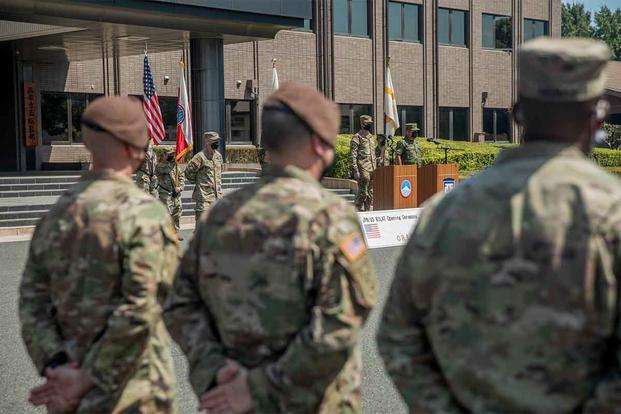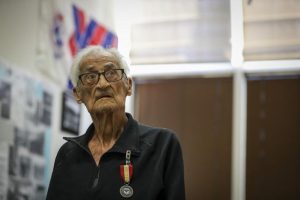A commander accused of toxic leadership, triggering a monthlong investigation. Senior officers accused of sexual assault, alcohol abuse, keeping soldiers away from home to the point of breaking military rules, and racism.
The Army’s 5th Security Force Assistance Brigade is facing potentially systemic problems with its leadership, a Military.com investigation has found.
“There is a lot of infighting here … not a lot of trust and certainly the least cohesive place I’ve been,” one senior 5th SFAB officer told Military.com.
The brigade’s commander, Col. Jonathan Chung, was suspended from his position as the head of 5th SFAB, headquartered at Joint Base Lewis-McChord, Washington, a month ago following accusations of counterproductive leadership. He’d been in command since July 2021.
The subsequent investigation confirmed those accusations and recommended that Chung be relieved of command, while outlining broader issues in the brigade, according to internal Army documents reviewed by Military.com.
“To an outside observer, [5th SFAB] consistently meets mission requirements and delivers results — a point of pride expressed by multiple members of the unit,” Brig. Gen. Michael Simmering, the investigating officer, said in his findings. “Internally, a significant portion of interviewed team members expressed a consistent fear of the commander, and many had a physical, visceral reaction when asked to speak about the overall command climate.”
Simmering currently serves as the deputy commanding general of the 1st Armored Division at Fort Bliss, Texas.
The 5th SFAB is struggling with internal turmoil and generational strife, with some senior leaders in the organization concerned the Army did a poor job vetting soldiers in its haste to build a new organization that was supposed to be elite, stacking the ranks with poor performers with disciplinary baggage. Meanwhile, those top-heavy ranks, filled with mid level officers and noncommissioned officers, see their senior leaders as poor communicators, abrasive and unprofessional.
The organization, created in 2019, is supposed to be the tip of the spear, building relationships and training troops for allied powers in the Pacific amid increasing tensions with China.
Yet the all-volunteer brigade has lost more than 116 troops in the past two years, a staggering drop for a unit that’s meant to only have about 800 soldiers, according to internal data. Soldiers interviewed blamed a combination of retention issues, service members getting in trouble and kicked out, and the Army doing a poor job pitching soldiers across the service about what SFABs do.
Military.com reviewed more than 30 official statements, given to investigators mostly from field-grade officers and command sergeants major, about Chung’s conduct that detail growing pains and problems the brigade has faced since being stood up. The publication also interviewed two dozen soldiers who have worked with Chung over the past decade. Most were granted anonymity to avoid retaliation.
Also, Military.com reviewed dozens of internal Army emails, text messages, audio recordings and videos, as well as a 2021 5th SFAB command climate survey and internal data suggesting the brigade has a history of disciplinary issues and struggles with being perceived as a serious organization by U.S. partners. None of the content reviewed by Military.com was redacted.
The documents taken as a whole not only outline issues with Chung’s leadership, but also reveal broader issues throughout the brigade. They also suggest a generational gap, wherein younger troops took particular exception to Chung’s style.
The 5th SFAB did not make a senior leader available for an on-the-record interview ahead of this story’s publication.
Chung did not respond to a request for comment for this story.
None of the soldiers interviewed by Army investigators or Military.com accused Chung of violating any laws, and there is no evidence he targeted troops based on race or gender.
“Bottom line, he’s a direct leader, very involved,” Command Sgt. Maj. Ryan Nagy of 2nd Battalion, 5th SFAB, told Military.com. “A lot of people probably aren’t used to that.”
SFABs were stood up by the Army between 2017 and 2020, with each brigade being regionally aligned with a different part of the world. The units are tasked with building relationships with U.S. partners, helping to build training programs, and developing connections between those units and the American military in case of war. The 5th SFAB’s area of responsibility is the Pacific, where it works with partner nations such as Thailand, Mongolia and Indonesia.
Army investigators found that the 5th SFAB has a “divisive, generally poor command climate” that can be best described as “a divided organization with low morale created predominantly by the organizational leadership style of [Chung].”
“He would constantly belittle the staff, sometimes comparing us to children, and frequently telling us how screwed up we are,” one Army officer told Military.com. “We might work 10 or 12 hours on something, only to be pulled into his office … sometimes for hours just for us to hear how terrible we are at our jobs.”
The officer’s account is consistent with those of most soldiers interviewed by Military.com and statements given to Army investigators. Soldiers painted a picture of Chung as a frenzied micromanager and would routinely scold troops for up to hours at a time over minor errors.
He also had nicknames for multiple officers he would use in front of others, according to the Army’s investigation, calling one officer “Merit Based” and another “Rex,” in reference to the dinosaur from “Toy Story.” However, in his statement to investigators, Chung either denied he had nicknames for his subordinates or characterized them as one-off gags, according to the final report. On at least two occasions, field-grade officers sought behavioral health services they say were a direct result of their treatment from Chung. At one point, there was a personal Wi-Fi hot spot in the brigade named “5th SFAB = depression.”
But the issues with 5th SFAB’s leadership goes beyond Chung and the investigation into his leadership, with multiple disciplinary actions taken against senior leaders and numerous ongoing investigations and troubling behavior from the rank and file.
The investigation also dug up issues with the brigade’s violations of temporary duty policy, or TDY, a mechanism for deploying soldiers on missions for 180 days or less. The investigation found systemic issues in which soldiers were returned home at the 179-day mark only to redeploy days later. Commanders can extend that time away from home through proper channels, though the investigation found those mechanisms weren’t employed.
The investigation recommended that Col. Lucas Braxton, the deputy commander of 5th SFAB, face administrative action, which could range from a scolding to separation from the Army. The investigation concluded he orchestrated at least 23 violations, effectively denying soldiers the opportunity to rest and spend time with their families between missions.
“I’m not recommending anything … yet. Just want to get down to clarity [sic] on what options are on the table and what risk is being assumed. I’m prepared to argue either way,” Braxton said in an email reviewed by Military.com in which he was asking subordinate commanders about effectively extending their deployments in violation of Army rules.
Braxton did not return a request for comment from Military.com.
However, 5th SFAB, a brigade of just under 700 troops, is overburdened by the Army with constant rotations abroad across multiple countries in the Pacific, according to troops who spoke to Military.com.
In a 2021 command climate survey for the brigade, in which soldiers can submit anonymous comments, respondents painted a bleak picture of the morale and behavior of 5th SFAB troops.
In one comment, a soldier said a staff sergeant “routinely” referred to his soldiers as “b—h” and “p—y,” which “resulted in fights and yelling matches.”
“Additionally, a member of the team carried a Confederate battle flag to Malaysia and has said the N-word on multiple occasions,” the soldier added, though it was unclear to whom they were referring.
The brigade isn’t alone in facing leadership issues, according to internal slides for a 5th SFAB two-day briefing reviewed by Military.com. They extend across the base where the brigade is headquartered, which includes 1-2 Stryker Brigade Combat Team and 2nd Ranger Battalion, and the 1st Special Forces Group.
More than 90% of complaints involved equal opportunity, a category that includes bullying, using disparaging terms and sexist behavior involving senior leader misconduct. Half the time, the complaints were confirmed, with leaders removed from their positions. The slide does not specify a timeframe, nor provide overall complaint totals.
The base saw 26 informal sexual assault or harassment complaints and 44 formal complaints during fiscal 2022, the briefing detailed. There were also 11 letters of concern, two letters of reprimand and 40 Article 15 proceedings exclusively at 5th SFAB since June 2021.
A 5th SFAB spokesperson said the data was from an early document draft and was inaccurate, but did not provide the finalized version for context.
Col. Meghann Sullivan, commander of the 5th Brigade Engineer Battalion, 5th SFAB, is facing allegations of sexually assaulting at least two subordinate men and harassing several others, according to three sources with knowledge of the situation.
One source said she forcefully kissed one man and groped another in separate incidents that allegedly involved alcohol abuse. At least one of those incidents was allegedly witnessed by Chung, though it’s unclear whether Sullivan faced disciplinary action. Sullivan was suspended this week, a spokesperson with the brigade confirmed to Military.com.
She did not respond to multiple requests for comment.
“Part of the problem is the previous command teams faced quickly standing up a new organization and putting bodies in slots,” Command Sgt. Maj. Shelby Reed of 6th Battalion, 5th SFAB, told Military.com. “In doing so, I think we hired a lot of individuals that weren’t mature enough to be here and weren’t ready for the challenges.
“We had a lot of disciplinary issues,” Reed added.
— Steve Beynon can be reached at Steve.Beynon@military.com. Follow him on Twitter @StevenBeynon.
Please rate this CIBA article
Vote






